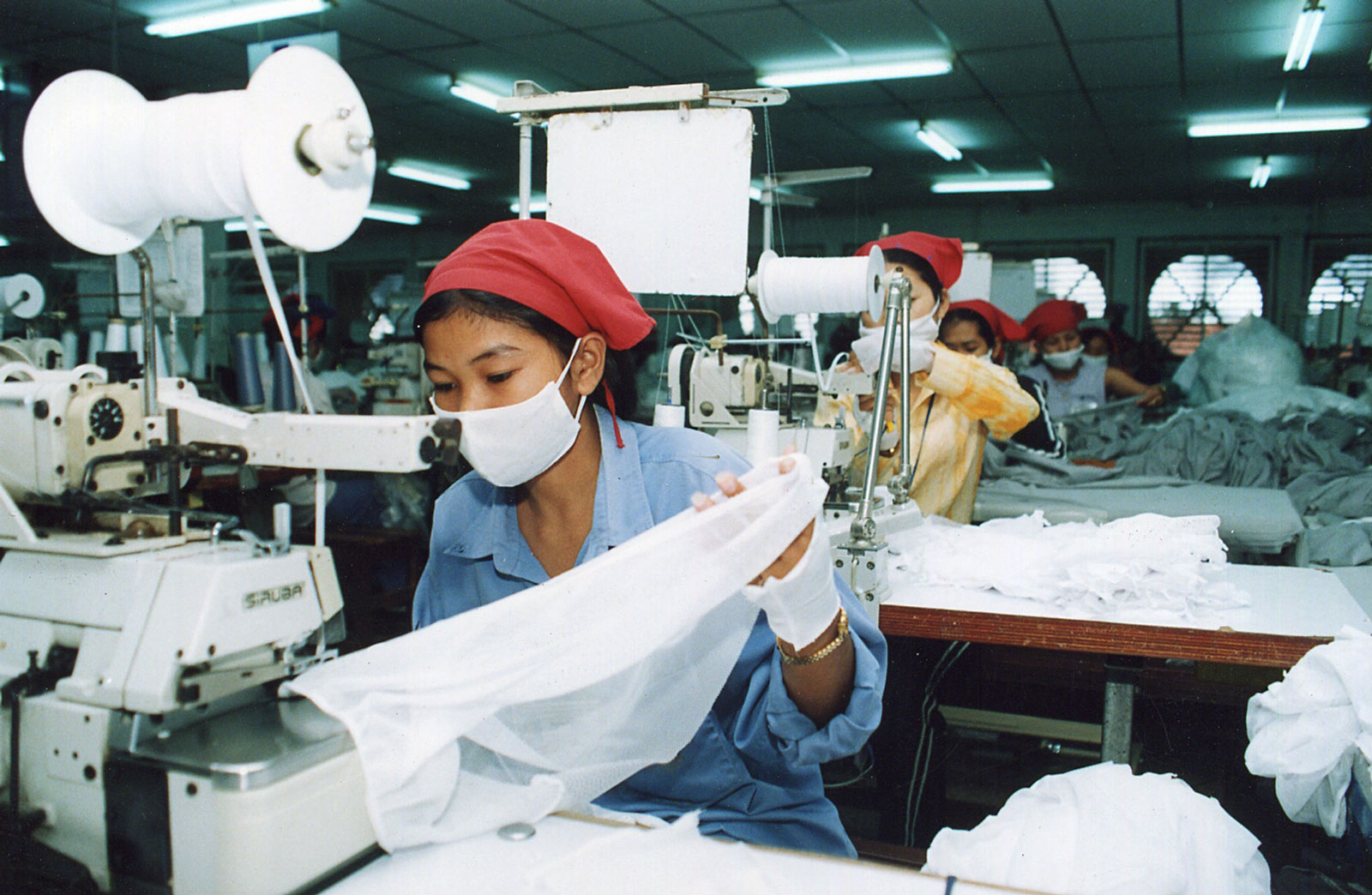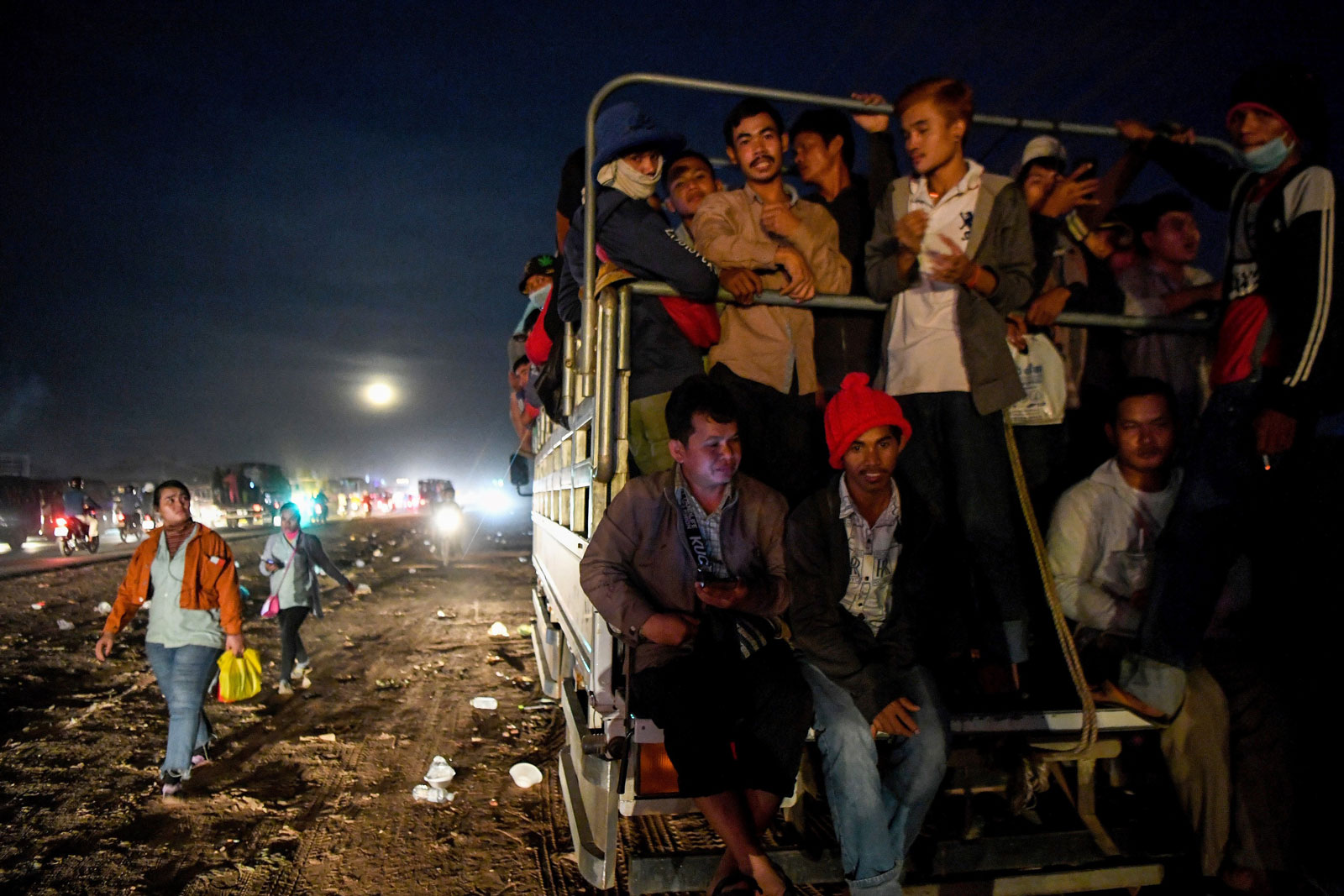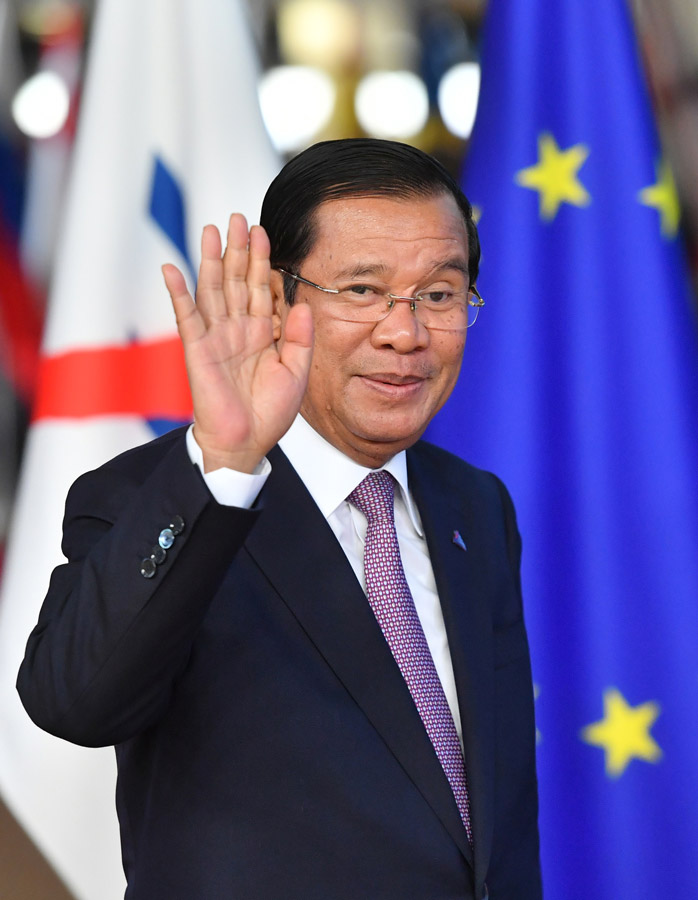Editor’s Note: A year ago on February 12 2019, the EU officially started Cambodia’s Everything But Arms withdrawal procedure, resulting in 12 months of political and economic uncertainty that has shaken both Cambodia’s elite and its thousands of factory workers.
Now, this process has finally come to an end as EU diplomats announced that the Kingdom will lose about 20% of its preferential rights, according to the European Commission website, citing “serious and systematic violations of the human rights principles”. The withdrawal amounts to around one-fifth, or €1 billion, of Cambodia’s yearly exports to the EU.
The EU’s decision will come into full effect on August 12, and while the impact of losing these vital trade preferences will only become apparent with time, you can read our analysis below, published earlier this week, on the potential outcomes for the Kingdom in the months to come.
Few acronyms stir up such animosity in Cambodia as EBA, the infamous Everything But Arms preferential trade status that guarantees duty-free and quota-free access on 99% of Cambodia’s exports to the European Union market.
A document published to the European Parliament website this weekend by Italian MEP Danilo Oscar Lancini seemed to inadvertently disclose that a partial withdrawal hitting certain products was imminent, but February 12 remains judgment day as the EU is set to officially decide on the Kingdom’s EBA fate. This follows an arduous 24-month period that has consumed headlines and shone an uncomfortably bright light on the government’s human and labour rights record.
But to make sense of the inevitable sound and fury that will surround the day should the EU decide to revoke EBA access, we need to go back to the beginning.
On February 28, 2001, the EU passed Council Regulation 416/2001 and birthed the Everything But Arms scheme. It had been crafted as a means of stimulating trade with Least Developed Countries – reflecting a modern form of development aid based on economic growth – and guaranteed unilateral duty-free and quota-free access to the EU. This made it markedly cheaper for the 49 countries then eligible for EBA (including Cambodia) to, as the name suggests, export everything but armaments and ammunitions to the bloc.
The situation in the Kingdom was still murky in 2001. The country was marred by decades of conflict that had stunted its development and, with a Gross Domestic Product of just $3.9 billion at the time, there was little doubt Cambodia was being tossed a lifeline.
Official EU figures highlight the scale of benefits Cambodia has enjoyed since it gained access to EBA. Exports from the Kingdom to the world’s largest trading bloc reached €2.5 billion in 2013 and, according to the EU itself, by 2018 this figure hit €4.9 billion, with 95.7% of those exports falling under the purview of EBA. Those numbers made Cambodia the second largest beneficiary of the deal, behind only Bangladesh.
But 2018 also marked a turning point for Cambodia. While economically it was thriving – the World Bank reported that Cambodia’s GDP had soared to $24.5 billion following seven consecutive years of annual growth above 7% – the political situation appeared to have seriously deteriorated.

Between 2016 and 2018, hopes for a truly democratic Cambodia began to fade with the stifling of the free press. The Cambodia Daily was taxed into oblivion in September 2017, while the Phnom Penh Post – after receiving its own multi-million-dollar tax bill – was sold off for parts in May 2018 to a Malaysian businessman who reportedly enjoyed close ties to the Hun Sen administration. Critics blasted the tax levies as politically motivated, a strategic silencing of the country’s most prominent independent news sources.
The Supreme Court then took the liberty of dissolving the opposition Cambodia National Rescue Party (CNRP) in November 2017, allowing the ruling Cambodian People’s Party to claim all 125 National Assembly seats in the 2018 national elections. Furthermore, Kem Sokha – former CNRP leader – was imprisoned on September 3, 2017 on treason charges widely regarded as a political manoeuvre from the Cambodian government.
These moves were just the latest to send jolts of fear down the spines of EU parliamentarians. Alarmed by the way Cambodia was slipping ever further from the democratic nation envisaged by the 1991 Western-brokered Paris Peace Accords, the EU set about flexing its diplomatic muscles on February 26, 2018 in a bid to set Cambodia back on course for democracy.
Citing Regulation (EU) No 978/2012, the European Commission began an intensive six-month monitoring period on February 12, 2019 during which it analysed Cambodia’s adherence to the 15 principles set out by the UN and the International Labour Organization on core human and labour rights which determine eligibility for EBA benefits.
What [the EBA] has done for us will be wasted. [The EU’s] leverage will be reduced. It means [they] will also help in killing the opposition
Prime Minister Hun Sen
By November 2019, the EU’s concerns were laid out in non-public, preliminary findings presented to the Cambodian government and hinted that Hun Sen’s efforts to appease the EU had been insufficient.
EU Spokesperson for Foreign Affairs and Security Policy Maja Kocijancic called for Cambodian authorities to “open the political space in the country”, adding that Sokha’s immediate release – including the dropping of charges against him and former CNRP members – would be vital if Cambodia hoped to retain EBA access.
Less than one week after Kocijancic’s statement was released on November 16, the prime minister issued a directive through the courts to release the 74 jailed CNRP members and activists on bail, saying they had been “misled by Sam Rainsy”. But Cambodian authorities strenuously denied there was any connection between their release and the European Commission’s report – just another coincidence in the Kingdom of Wonder.
Much of the government’s official response to the EU has been cloaked in strongman grand-standing, with Hun Sen himself appearing unfazed by the prospect of the EU’s punitive measures.
“What [the EBA] has done for us will be wasted. [The EU’s] leverage will be reduced. It means [they] will also help in killing the opposition,” he told graduates at a ceremony in November.
Widely derided as a sham, the trial of former CNRP president Sokha kicked off on January 15 2020 with only restricted access for media outlets, civil society organisations and NGO observers. Set to last three months, the trial has garnered international attention given the foreboding sense that Sokha is being held ransom until the EU plays its next hand.
Now, with so little time left on the clock until the monumental February 12 EBA deadline, both sides are playing coy – with Kuong Koy, spokesman for the Cambodian Ministry of Foreign Affairs and International Cooperation and Pok Puon, press officer for the EU Delegation to Cambodia, both declining to comment to Southeast Asia Globe until after the EU’s announcement.
Rumours and speculation of what the EU will do, how Hun Sen will react and what all of this means for the Cambodian public have been circling. But even a partial withdrawal of the benefits bestowed upon Cambodia by EBA would likely have significant impact on the Kingdom’s economy, its international standing and the 700,000 people employed in the garment and footwear manufacturing sector.
“Complete removal of EBA could impact as many as three million people,” warns Kimlong Chheng, director of the Centre for Governance, Innovation and Democracy at local think-tank Asian Vision Institute.
“There may be some 700,000 employed directly in garment manufacturing, but their dependents – families, businesses that rely on factory workers and so on – could be almost one fifth of the population,” he says, adding that a total withdrawal of EBA privileges would cost Cambodia between $620-650 million a year based on 2019’s export figures.
These are the people who stand to lose the most in the government’s game of brinkmanship with the EU. The World Bank’s economic outlook for Cambodia highlighted the value of this sector, claiming that garment and footwear products account for “about 70 percent of total merchandise exports”, adding that about 40% of Cambodia’s exports go to the EU.
Vice president of the Cambodian Federation of Employers and Business Associations, Sandra D’Amico, says they are bracing for a partial loss of EBA, but that it remains unclear what that will mean.

Garment workers stand in a truck, which they use to commute to and from work, in Kampong Speu province. Photo: Tang Chhin Sothy/AFP
“There’s going to be job losses because for sure there will be some factories that close whether [the withdrawal of EBA] is 20 or 50% or whatever, there’s going to be job losses,” admits D’Amico.
“I think now the EU has to think very carefully about what it is going to impose, because this is really going to affect relations … It’s going to undermine a lot of their investments in Cambodia over all these decades in helping the Kingdom come back from the civil war and from the Pol Pot regime.”
D’Amico argues that an investment in infrastructure, as well as upskilling and retraining workers, will help to offset the job losses she predicts will occur in the event of a partial or total withdrawal. However, she warns a withdrawal could lead to increasing numbers of Cambodians migrating abroad for less stable work, while an increase in Chinese foreign direct investment would probably mean less focus on human and labour rights.
Meanwhile, Kaing Monika, deputy secretary-general of the industry group Garment Manufacturers Association in Cambodia (GMAC), says much of the damage has already been done.
“We already felt the impact to the EU market – last year exports saw no growth compared to the year before, we used to have double-digits growth before the EBA issue,” he notes, adding that uncertainty about the EU’s decision has created disruption in relation to orders placed to Cambodian factories.
However, the Cambodian Ministry of Economy and Finance (MEF) has been working to mitigate some of this uncertainty with the introduction of a fiscal stimulus package that the World Bank reported as being approximately equal to 3% of GDP – roughly $750 million – that will be on standby for the loss of EBA.
“We are aware of the stimulus package as it was adopted in the 2020 budget law at the end of last year. We have not been consulted yet, but I think it makes sense to wait for the clear result of the EU’s decision first,” reasons Kaing.
With this in mind, it looks as though Hun Sen may be able to weather the economic storm, but the political fallout promises to be toxic.
“Trade sanctions signal to Hun Sen, the Cambodian population and the world about what is not acceptable state behaviour and influence perceptions of what should be considered as normal,” explains Cindy Cao, an associate researcher at the European Institute for Asian studies (EIAS), who agreed to speak to Southeast Asia Globe in a personal capacity.
She notes that in this scenario, the EU is caught between a rock and Hun Sen.
“On one hand, it can be seen as more ethical than saying and doing nothing,” she says of withdrawing Cambodia’s EBA status. “If the EU would allow continued access [to EBA], despite increased repression, it would undermine the credibility of trade sanctions.”
“It is possible to argue that an authoritarian regime would prefer to pay an economic price rather than comply because democratisation would imperil its survival,” she continues, adding that the EU will have to accept some responsibility for the impact their decision will have on ordinary Cambodians. “But if the government responds positively to the EU’s demands – the release of Kem Sokha, the reconstitution of the CNRP and an end to the restrictions on media and civil society – it could indeed be a game changer.”
This sentiment is echoed by Pisey Pech – senior director of programmes with Transparency International Cambodia – who regards EBA as an engine of growth in the Kingdom. However, he admits that true reform seems unlikely given the issues stemming from Hun Sen’s style of governance.
“It is not clear what the final decision planned for this month will say, but efforts made by the government so far to meet the imposed conditions of the EU seem rather insufficient,” Pisey warns.

Despite Hun Sen’s attempts to position himself as the unfaltering muscleman of Cambodia, his downplaying of the impact of EBA withdrawal is not echoed throughout the government, as Chheng observes.
He points to the MEF’s claim that they collected $6 billion in tax revenue over the course of 2019, up from some $4.7 billion in 2018.
“I don’t know whether that statistic is accurately recorded and reported or if it’s because of some political motivation, perhaps the government trying to tell the people not to worry and that we’ll be okay,” says Chheng, adding that at local levels, there are many politicians scared their tax revenue will be severely impacted by EBA withdrawal.
Chheng also warns that though EBA withdrawal may seem like an effective tool in the EU’s arsenal to force the government to bring human, labour and political rights into alignment with international standards, it will further push Cambodia into the arms of other superpowers – namely China – but also major trading partners such as Japan or South Korea.
But it doesn’t have to be this way, he argues. There is a middle-ground that enables the EU to retain their influence over Cambodia’s deteriorating democracy while similarly giving Hun Sen enough cause for concern to seriously consider the EU’s demands and save workers from destitution.
“The best way is to find a common ground where no-one will lose face. For the EU, once they’ve launched the formal process of withdrawing EBA, it’s a legal process, it’s a very strong process so the EU doesn’t want to lose face … neither they or the Cambodian leadership want to lose face,” he says.
Chheng notes that some 7200 products are guaranteed duty and quota-free under EBA, and the EU could tactically remove a number of products from that protected list.
I think the government will just say the EU has become useless – ‘no more, we don’t need more from the EU’ and it will be easy for them to blame failures on them rather than the past
Kimlong Chheng, Asian Vision Institute
“So maybe out of the 7200, the EU removes say 3000, but spares a few of the bigger export items, this would be much better. The government would feel that it is a threat,” he argues.
This Chheng contrasts to the prospect of a total withdrawal, which all analysts consulted deem unlikely, but would likely serve as a stick for the Cambodian government to beat the EU with should it materialise.
“I think the government will just say the EU has become useless – ‘no more, we don’t need more from the EU’ and it will be easy for them to blame failures on them rather than the past,” he says.
But whatever the result on February 12, the relationship between the EU and Cambodia looks set to become ever more strained as Hun Sen prepares to show the world just how much he will sacrifice to retain his extractive grip on the Kingdom.
But, ultimately, will it end up being the average Cambodian who suffers the EU’s wrath?


